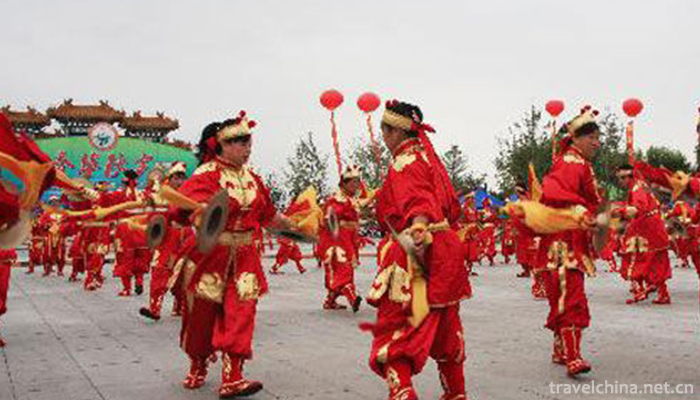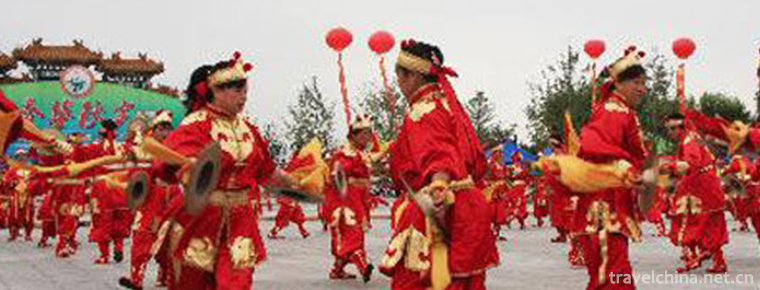Prince Wuwuwu quarrel
Prince Wuwuwu quarrel
Prince Wujiaozi is one of the unique traditional folk dances in Beijing. It integrates entertainment, fitness and performance. Wujiaozi has a strong style, rough style, relaxation and generosity. Participating in Wujiaozi activities can make people happy physically and mentally, enhance understanding and live in harmony. It has a high social, folk and cultural value. It has a certain representation in Beijing.
On November 11, 2014, the prince Wuwu quarrel was approved by the State Council to be included in the fourth batch of national intangible cultural heritage list.
origin
It is rumored that the Prince Wuwu Quarrel Society was founded around 1728. The predecessor was a literary quarrel, and later formed a quarrel in the practice of martial arts and entertainment activities. Back to the end of the Qing Dynasty, it has been passed down to four generations: Li Yonglin and Li Defu (late Qing Dynasty - 1937), Xiu Wanqing, Wang Zhishun, Cui Duan (1937 - 1972), Wang Zhenlu (1972 - 2001), Wang Rong and Zhao Jianjun (2001 - today).
Present situation
As a kind of folk art, the instruments used by Prince Wuwu Noissants are: flute, pipe (star), boring (trip), drum, cymbal, cymbal, cymbal, cymbal and so on. Existing traditional music cards include "Qian Chao Feng", "Wen Chao Feng", "Kaishan Tiger", "Xiaojinshan", "Dragon Tiger Leaf" and so on. Prince Wuwuwu quarrel's movements are complete sets, each of which consists of several cymbals. The peculiar action is that the cymbals team accompanied by drum music perform kicking, jumping, fighting, Festival height, golden cock fighting and bright fan, turning over and beating, Su Qin back sword and so on. In 1953, Prince Wu Wujiaozi represented Tongzhou District to attend the First Flower Fair Exhibition in Hebei Province and won a memorial medal. On October 1, 1959, he participated in the 10th anniversary of the founding of the People's Republic, the 35th anniversary of the founding of the People's Republic in 1984, and the 40th anniversary of the founding of the People's Republic in 1989.
The main problems faced by the prince Wuwu noisy sons are the aging of the inheritors, the old venues and props, etc.


-
1.Baiyunshan National Forest Park Luoyang
Baiyunshan National Forest Park is located in the primitive forest area of Funiu Mountain in the southwest of Songxian County, Luoyang City, Henan Province, with a total area of 168 square kilometers
Time 2019-02-06 -
2.Legend of Cang Jie
Cangjie Legend is an ancient Chinese folklore. The story of Cangjie's writing originated from the Yan and Huang Dynasties and has a history of 5,000 years. Legend has it that in
Time 2019-04-04 -
3.Tibetan knitting and embroidery
Tibetans are good at embroidery and textile, and exquisite craftsmanship adds infinite charm to their costumes, which is the most prominent manifestation of Tibetan
Time 2019-04-05 -
4.Drum and percussion music in Southwest Shandong
Southwest Shandong drum music is a kind of traditional folk instrumental music in Shandong Province. It takes Jiaxiang drum music as a typical representative and mainly distributes in Jining, Zaozhuan
Time 2019-05-15 -
5.Ma Street book fair
The Majie Book Club is a grand Chinese folk music festival. Located 5 kilometers south of Baofeng County, Henan Province, it is a "pilgrimage site" for rap artists all over the country. Ever
Time 2019-05-15 -
6.Mira Gahei Mile La Ga Hei
Mira Gahei, Dongxiang folk tale. Also known as "Moonlight Mirror". Among the Dongxiang people, there are also poem-style stories of "Mira'er Hei", which are intermingled in rhyme a
Time 2019-06-04 -
7.Tujia Wedding Song
The Tujia people living in the border areas of Hunan, Hubei, Chongqing and Guizhou are an ancient civilized nation with a long history and traditional customs, and retain strong national characteristi
Time 2019-06-23 -
8.Xiping Folk Song
Xiping Folk Song is a traditional folk song in Xiping Town, Xixia County, Nanyang City. Xiping Town, located in the hinterland of Funiu Mountain in Western Henan Province, is located in the combinatio
Time 2019-07-01 -
9.Xibo Folk Songs
Xibo folk song is an important kind of traditional music culture of Xibo nationality, which is widely spread among the Xibo people in Chabchal Xibo Autonomous County and Xinjiang. Folk songs are an im
Time 2019-07-01 -
10.String Dance
String dance is popular in Sichuan, Yunnan and other Tibetan areas and in Changdu, Tibet. String dance is an indispensable self-musical dance in Tibetan people's life. During festivals, weddings and g
Time 2019-07-03 -
11.Left power blossoms
The style of Zuoquan folk songs began to take shape in Sui Dynasty. In 1930s, Zuoquan flowering tune was derived from Zuoquan folk songs. Zuo Quan's blooming tunes are exquisite in conception, novel i
Time 2019-08-16 -
12.Beijing Sport Univerrsity
Beijing Sports University was founded in 1953, formerly known as the Central College of Physical Education, renamed Beijing Sports College in 1956 and Beijing Sports University in 1993. It is a nation
Time 2019-09-06